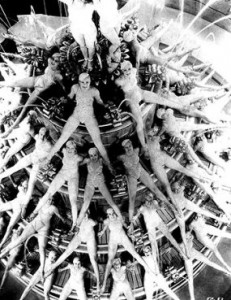It was those words, all published on the same day in the same newspaper by just three journalists, which has inspired this article. But what on earth are they writing about, and why the huge level of criticism? And who was Busby Berkeley?

They were all writing in The Daily Telegraph on 10th January, the day after it was announced that the TV interview of the disgraced cyclist, Lance Armstrong, would be conducted by Oprah Winfrey on US television on 17th January. It was thought that Mr Armstrong often deviated from the truth when asked about drug-0taking. The founder of Change Cycling Now, Jamie Fuller, was quoted as saying “We will hear the convenient truth; the parts that will work best for his image manipulation.” It would seem we don’t like bad people being let off lightly, and we don’t like the media to be complicit when we (the public) think someone has done something they should answer for. We want the naughty ones grilled by a tough interviewer, acting as the people’s interrogator.
We want confession and contrition much more than redaction and redemption. It seems we don’t fully respect Oprah Winfrey in this regard, although there are few who would dispute for contrast the UK’s own Jeremy Paxman’s stinging ability to give interviewees the Brown Trouser Treatment. The Armstrong interview, in bits, is still on the internet along with significantly more than enough analysis by body language and voice experts. The interview is worth a look, was indeed heavily choreographed, and included Armstrong being asked a series of closed questions with yes/no answers. After an appropriate pause in each case, he duly confessed his sins in plain English.
Other parts of the interview allowed him to be contrite, and to explain and justify himself. It’s at these points you get the sense he is trying to gain our support, understanding, forgiveness and even for us to admire him.
Why does it matter that the interviewer is tough on their interviewees? Because we want to know the whole truth, even if it is painful, humiliating and self-damaging to tell, and not just selected easy extracts.
We can easily spot and don’t like someone getting away with an evasive or equivocative answer, and we don’t like being treated as gullible fools who will swallow any old yarn. We don’t mind if it is put in context, as that adds to accuracy.
Getting this right in the business world can be as hard as walking the sharp edge of a knife.
So what? Why might this matter to you?
First, just to be clear, I am not accusing any of you of being the bad ones, but I would like you to appreciate that in any pivotal Q&A situation, be it in the media or in a business setting, we expect those who ask questions to be tough.
Also we expect that respondents who have to answer such questions should be put under some pressure, in order to distinguish between those who should be given the business and those who should not.
Over the last 20 years or so that we have been advising in this space, most people have become more effective presenters. So the questioning phase has become all the more important as a selection tool.
Yet still we find firms do not devote adequate time to the prepping for the likely tough questions, and thus often fluff their way through their answers in an unconvincing manner.
Such a meeting style is common in a new business pitch setting, in a negotiation on costs, and as already noted, in a media interview. We’ve coached extensively in all these areas, and have some good general advice below to share around.
There is a profound difference between open (infinite) and closed (4 option) questions. Oprah Winfrey had a mix of the two for her interview with the wriggly Lance Armstrong.
Closed questions seek a commitment, although I admit we’d all struggle with any answer to ‘Did you lie to the Senate?”. The 4 options of: yes, no, maybe and I don’t know are deliberately limiting.
Armstrong knew that to stand any chance of winning people round he would have to confess, and the one word ‘yes’ answers he gave really did that, even if they shocked with their simplicity and gall.
Open questions allow for elaboration, which can be very helpful, but can result in saying too much. They also allow for obfuscation and deviation; they give wriggle room for squirming off the hook. Journalists know this, I hope you do too.

So where can you take these goodies? Well, it sounds obvious, but first work out which type of question you have been asked. You will often have multiples, possibly some open questions, some closed. Second, decide if you want to answer the closed questions. If you don’t want to answer, don’t; but if you don’t, try to say why, and pass our ‘Reasonableness Test’ with what you say. If you do want to answer, then please get on with it. Start with the answer! This will set you apart from politicians and time wasters.
For the open questions, go for the short version of the answer first, then elaborate if necessary. Try to find a place to stop, as the next question will be waiting like a plane trying to land at Heathrow. Keep it waiting too long, and it will just divert.
By the way, Busby Berkeley was a Hollywood movie director. He created those elaborate productions that often involved complex set-stage dances by a crowd of showgirls, heavily choreographed and exquisitely performed.
No, I confess I didn’t know who he was either. He died in 1976, having been one of the saviours of the Great Depression of 1920s USA. Many people there ‘escaped’ by going to see his wonderfully elaborate films. I sense we’re not that desperate now, so perhaps things are not so bad after all…

